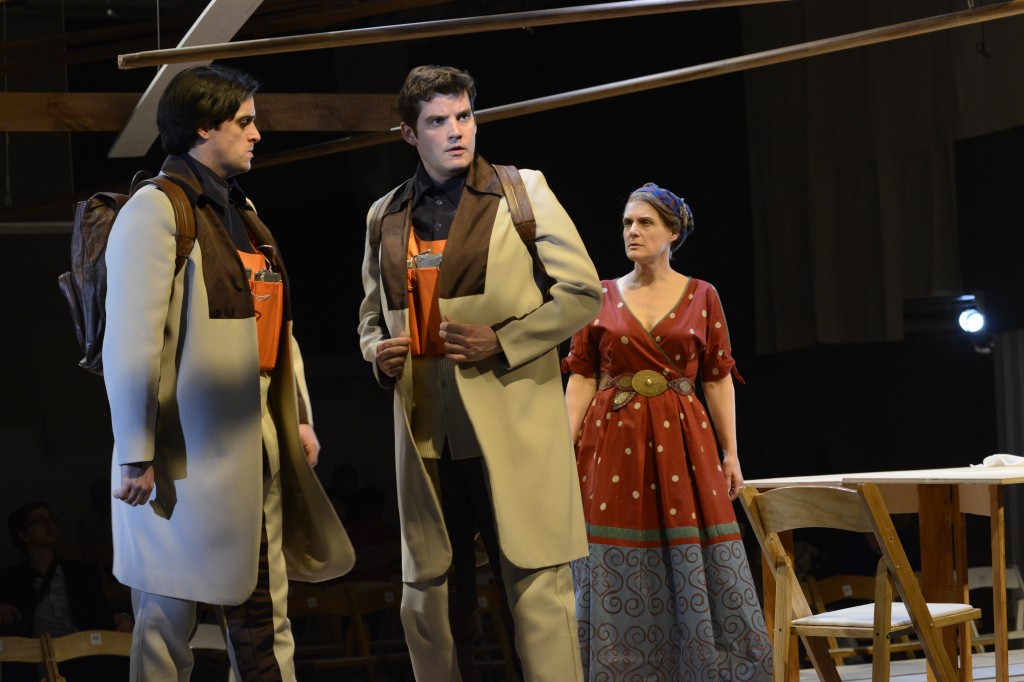Opera Review: An Uneven “Clemency” at the Boston Lyric Opera Annex
After two of the four scheduled performances of the North American premiere of James MacMillan’s Clemency were canceled over the weekend, because of the weather, Boston Lyric Opera (BLO) is responding to demand by adding a performance on Monday, Feb. 11 at 7 p.m.
Composer James MacMillan’s musical strategy in this opera is a stylistic patchwork that seems to mean to convey that each character inhabits a different, mutually misunderstood world.
Clemency. Composed by James MacMillan. Libretto by Michael Symmons Roberts. Directed by Andrew Eggert. Conducted by David Angus. Presented by Boston Lyric Opera Annex. At the Artists for Humanity EpiCenter, Boston, MA, through February 11.
By Debra Cash
There is a coup de theatre at the heart of Boston Lyric Opera (BLO) Annex’s production of James MacMillan’s brief opera, Clemency.Three mysterious travelers dressed in stylized frock coats have arrived to gobble down a hastily assembled lunch under the spreading tree of Biblical patriarch Abraham and his wife, Sarah. In exultant, massed chromatics, they have informed the couple that despite their advanced ages, Sarah will become pregnant and have a son, an assertion that, in the score and the narrative from the Book of Genesis that inspires it, makes the old woman laugh with delighted incredulity.
But the happy news is offset by threat. These announcers of generativity have arrived to destroy as well. The strangers have arrived to bring ruin to the “twin towns”—a phrase that to contemporary American ears inevitably rings with associations to New York’s twin towers. They open their leather backpacks. They take out orange florescent vests. Then these angels of life and death equip themselves as suicide bombers.
Andrew Eggert‘s direction for the U.S. premiere of Clemency attempts to follow composer MacMillan’s conflation of the mythic and the contemporary but meets the challenge only intermittently. BLO’s commitment to co-commissioning this new work with the Royal Opera House Covent Garden, Scottish Opera, and the Britten Sinfonia is worth celebrating, and its idea of bringing it to the unconventional venue of the Artists for Humanity EpiCenter as part of its ongoing Opera Annex series was inspired. The vast space had been outfitted by designer Julia Noulin-Merat—who by report has inspired at least one ambitious young person involved in Artists for Humanity‘s program to seriously consider a career in set design—with a pale, wooden thrust platform overhung with scattered planks to evoke a shady tree and two small interior sets on side platforms, one holding a small bed, the other an almost-modern “living room” outfitted with twin rocking chairs, a patchwork quilt, and a television with rabbit ears. The singing human characters were shadowed by non-singing actor doppelgangers, a decision that never quite conveyed anything.
MacMillan’s musical strategy is a stylistic patchwork that seems to mean to convey that each character inhabits a different, mutually misunderstood world. This decision keeps the score from cohering aurally or emotionally. Abraham’s exposed a cappella chant in an invented language, and his later bargaining with the angels for the reprieve of the twin towns if only they can find five inhabitants “good in heart and mind,” was sung with warm resonance and welcome articulation by noted Boston baritone David Kravitz (next to be heard locally in Emmanuel Music’s production of John Harbison’s The Great Gatsby). His voice twined companionably around that of California soprano Christine Abraham, who sang and acted with an easy warmth throughout, despite the oddities of lyrics that implied Sarah’s impending motherhood might be an angelic conception via “ice seeds” and vocal writing that seemed derived from John Adams’s Doctor Atomic.

Christine Abraham, Neal Ferreira, and David McFerrin in the BLO production of CLEMENCY. Photo: Eric Antoniou
The trio of travelers—Samuel Levine, Neal Ferreira, and David McFerrin, all local singers—served MacMillan’s dense and most interesting vocal writing faithfully even as the chorales veered into Christmas carol territory. MacMillan has given the string orchestra (conducted from behind the BLO performance space in a small alcove by David Angus, who was visible to the singers over discreetly placed closed circuit monitors) a commentary role awash in an unsatisfying grab bag of Eastern European doinas and Middle Eastern modalities.
At less than an hour long, Clemency tries to pack a lot of information into its episodes and even rolls the Biblical story of the Binding of Isaac—surely worth its own opera!—into a digression where the English text is displayed but not sung during an orchestral interlude. It’s possible that over time the opera will be adjusted and perhaps new scenes will be added, something that has happened to many other operas after their premieres. Just before this week’s record-setting blizzard, MacMillan attended the BLO performance I saw Wednesday night; a live recording is in the works.
To stretch out the production, BLO prefaced Clemency with a thematically linked performance of Franz Schubert’s Hagar’s Lament that retells Genesis 21, in which Hagar, mother of Abraham’s firstborn son, Ishmael, is sent out into the wilderness to die with her child. Hagar’s Lament was the 15-year-old Schubert’s first published song, and the teenage composer threw whatever vocal fireworks he could imagine at Clemens August Schücking’s poetic monologue. Longy-trained Michelle Trainor, a BLO Emerging Artist, has a big belting sound but rough transitions between her head and chest tones and hasn’t yet learned how to use musical variety to dramatic advantage. Still, having the figure of Hagar presented in such vivid terms at the start of the BLO program made her silent presence serving at Abraham and Sarah’s table during Clemency intriguing. What other emotional truths and perceptions are hidden in the cryptic verses of the Biblical narrative?
c 2013 Debra Cash
Tagged: Andrew Eggert, Boston Lyric Opera Annex, Clemency, James MacMillan

